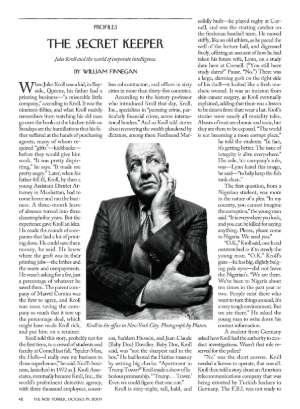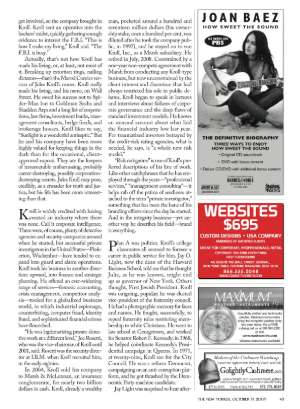Note: New Yorker has been more honest than most when it comes to Kroll and cancer scamming sweetie, Tig Notaro(AKA Nick Kroll's "oldest and best comedy friend.) Here's a still evolving companion piece- http://henypire.blogspot.com/2014/01/review-of-kroll-show.html
The Secret Keeper
Jules Kroll and the world of corporate intelligence.
by William Finnegan October 19, 2009
Subscribers can read the full version of this story by logging into our digital archive. Not a subscriber? Get immediate access to this story, along with a one-month free trial, by subscribing now. Or find out about other ways to read The New Yorker digitally.

ANNALS OF DETECTION about Jules Kroll
and corporate intelligence. In 1972, Jules Kroll launched J. Kroll
Associates, which eventually became Kroll, Inc., the world’s preëminent
detective agency, with three thousand employees, countless
subcontractors, and offices in sixty cities in more than thirty-five
countries. Last October, Kroll, aged sixty-eight, spoke to a crowd of
students and faculty at Cornell, his alma mater. According to the
history professor who introduced Kroll that day, Kroll, Inc.,
specializes in “pursuing crime, particularly financial crime, across
international borders.” And so Kroll told stories about recovering the
wealth plundered by dictators, among them Ferdinand Marcos, Saddam
Hussein, and Jean-Claude (Baby Doc) Duvalier. Kroll’s stories were
nearly all morality tales. But breaking up extortion rings, nailing
dictators—that’s the Marvel Comics version of Jules Kroll’s career.
Kroll really made his living, and his name, on Wall Street. He owed his
success to Goldman Sachs and Skadden Arps and a long list of
corporations, law firms, investment banks, hedge funds, and brokerage
houses. He and his company have been more highly valued for keeping
things in the dark than for the occasional, client-approved exposé.
Kroll is widely credited with creating an industry where there was none.
Call it corporate intelligence. His company offered a range of
services— forensic accounting, crisis management, competitor
analysis—tooled for a globalized business world, in which industrial
espionage, counterfeiting, computer fraud, identity fraud, and
sophisticated financial crimes have flourished. “He was legitimatizing
private-detective work at a different level,” Joe Rosetti, who was
vice-chairman of Kroll until 2001, said. In 2004, Kroll sold his company
to Marsh & McLennan, an insurance conglomerate, for nearly two
billion dollars in cash. Kroll pocketed around a hundred and seventeen
million dollars, and he stayed on to run Kroll, Inc., as a Marsh
subsidiary. He retired in 2008, and he’s begun to speak in lectures and
interviews about failures of corporate governance and the flaws of
standard investment models. What is needed, he says, is “a whole new
risk model.” At Kroll, Inc., Jules Kroll hired former prosecutors,
accountants, investigative journalists, academics, and specialized
researchers. Kroll’s background checks quickly became a standard
business tool in the financial industry. Mentions Daniel Karson.
Describes Kroll’s investigation into the hanging of the Italian banker
Roberto Calvi, in London. Kroll, Inc., does not have the power of
subpoena or the power of arrest. But Jules Kroll has hired plenty of
graduates of the C.I.A. and other secret services, such as M.I.6 and the
Mossad. The company has suffered its share of embarrassments. Mentions
Martin A. Siegel, who was harassed by Kroll operatives so that he
wouldn’t testify against an arbitrageur at Goldman Sachs. In 2004,
federal police raided the firm’s São Paulo offices and arrested five
employees. Texas billionaire R. Allen Stanford, who was accused of
operating a multibillion-dollar Ponzi scheme and indicted last June, was
a longtime Kroll client. With its international intelligence networks
and their sometimes unnerving abilities, Kroll began to be described as
“a private C.I.A.” The terrorist attacks of September 11th generated a
grim surge in business for Kroll, as corporations rushed to improve
their security plans. This summer, Jules Kroll launched K2 Global
Consultants, a risk-consulting and investigations firm, with his eldest
son, Jeremy.
Subscribers have access to the current issue and the complete archive of The New Yorker, back to 1925. Subscribers also can access the current issue on tablets and phones via our digital edition. If you subscribe to the magazine, register now to get access. If you don't, subscribe now.
To search for New Yorker cartoons and covers, please visit our store.














No comments:
Post a Comment